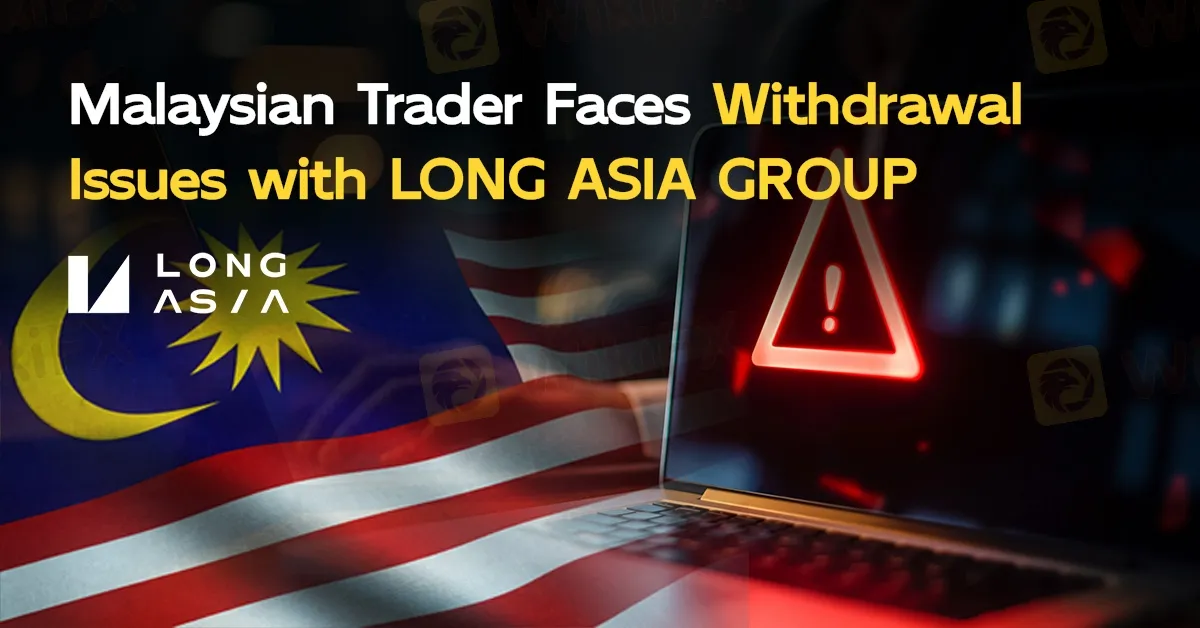简体中文
繁體中文
English
Pусский
日本語
ภาษาไทย
Tiếng Việt
Bahasa Indonesia
Español
हिन्दी
Filippiiniläinen
Français
Deutsch
Português
Türkçe
한국어
العربية
Malaysian Trader Faces Withdrawal Issues with LONG ASIA GROUP
Abstract:In a concerning development within the online trading community, a Malaysian trader has reported significant difficulties in withdrawing his funds from LONG ASIA GROUP, a broker that has come under scrutiny for its questionable practices and revoked regulatory status.

In a concerning development within the online trading community, a Malaysian trader has reported significant difficulties in withdrawing his funds from LONG ASIA GROUP, a broker that has come under scrutiny for its questionable practices and revoked regulatory status. The trader, identified as Aaron, has been attempting to withdraw approximately $330 from his trading account since 2nd of August 2024. Despite his repeated efforts, Aaron's withdrawal request remains in a “pending” status, leaving him in financial limbo for over three weeks.

Aaron's ordeal began when he initiated the withdrawal process with LONG ASIA GROUP, expecting a routine transfer of funds. However, what he encountered was a series of delays and unfulfilled promises. As days turned into weeks, the broker continued to assure him that his withdrawal request was being processed, yet no funds were transferred to his account. The prolonged delay and lack of transparency have raised serious concerns about the broker's practices and its ability to honour its financial commitments to its clients.
The situation is further compounded by troubling revelations about LONG ASIA GROUP's regulatory status. The broker claims to operate under a license issued by the Australian Securities and Investments Commission (ASIC), with license number 001303060. However, a thorough investigation into the broker's regulatory standing reveals that this license has been revoked. The official regulatory status of LONG ASIA GROUP is now classified as “Revoked,” signalling a potential breach of compliance with financial regulations.


The revocation of an ASIC license is a significant red flag for traders and investors alike. ASIC is known for its stringent regulatory framework designed to protect consumers and maintain the integrity of the financial markets. The fact that LONG ASIA GROUP no longer holds a valid license from this reputable regulator casts doubt on the broker's legitimacy and raises concerns about the safety of funds entrusted to it by traders.
Aaron's case is unfortunately not an isolated incident. The withdrawal issues he faces are symptomatic of broader problems within the online trading industry, where unregulated or poorly regulated brokers operate with impunity, often leaving traders with little recourse when things go wrong. The revocation of LONG ASIA GROUP's ASIC license should serve as a stark warning to traders considering engaging with the broker. Regulatory revocation typically occurs when a broker fails to comply with legal and financial obligations, which can include improper handling of client funds, lack of transparency, or other violations that put traders at risk.
The ongoing situation with LONG ASIA GROUP underscores the importance of conducting thorough due diligence before engaging with any online broker. Traders must verify the regulatory status of a broker and ensure that it holds a valid license from a reputable financial authority.

Disclaimer:
The views in this article only represent the author's personal views, and do not constitute investment advice on this platform. This platform does not guarantee the accuracy, completeness and timeliness of the information in the article, and will not be liable for any loss caused by the use of or reliance on the information in the article.
Read more

WikiFX Announcement: Suspension of Weekly Simulated Trading Competition
Since its launch in early 2023, the WikiFX Weekly Simulated Trading Competition has successfully hosted 99 consecutive rounds, attracting enthusiastic participation from traders worldwide and creating countless thrilling trading moments.

What Can Forex Traders Learn from Ne Zha?
The animated blockbuster Ne Zha: Birth of the Demon Child tells the story of Ne Zha’s journey to defy fate and take control of his own destiny. Beyond being an inspiring tale filled with action and character growth, the film conveys profound life lessons - many of which resonate deeply with the world of forex trading.

Retirement Savings Wiped Out: RM500,000 Lost to a Scammer named Richard Ong
A retiree was deceived into parting with more than RM500,000 after falling victim to an elaborate investment scam that promised substantial returns.

The Dark Side of Social Media Investments: How a Manager Lost RM2.08 Million
A Malaysian company manager suffered financial losses amounting to RM2.08 million after becoming the victim of an investment scam promoted through Facebook.
WikiFX Broker
Latest News
Forex Market Outlook: Key Currency Pairs and Trading Strategies for March 24–28, 2025
Singapore Police Crack Down on Scams: $1.9M Seized, 25 Arrested
Gold Prices Swing Near Record Highs
XTB Opens New Dubai Office
The Growing Threat of Fake Emails and Phishing Scams
Africa Cybercrime Bust: Over 300 Arrested in Fraud Crackdown
Hong Kong Banks and Authorities Collaborate to Freeze Fraudulent Accounts Faster
SocialFi and the Forex Market: A New Era for Decentralized Social Trading?
Is Billion Bucks Fx Scam?
BaFin Halts USDe Token Issuance, Citing Serious Compliance Failures
Currency Calculator







